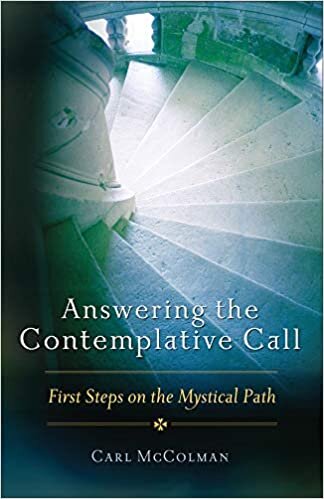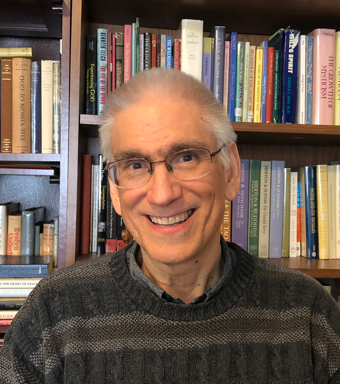“We offer worship to God by being silent before Him.”
Ep. 15: “Christians Do Meditate” With Guest Carl McColman
Are you confused about meditation? What is it? If it really is Christian, why are some people resistant to it (like I was for years) and others critical or even afraid of it? When did Christians start meditating? How do you do it? In this episode, I was thrilled to discuss all of this with Carl McColman, contemplative writer, speaker, teacher, soul friend, and storyteller.
Watch the Interview Here
Listen to the Audio File Here
Show Notes
Carl McColman is contemplative writer, speaker, teacher, soul friend, and storyteller—based near Atlanta where he lives with his wife. His spiritual teachers are the Trappist monks, specifically at the Monastery of the Holy Spirit in Conyers, GA, and he is a commissioned Centering Prayer presenter.
Carl’s spiritual journey began with a Lutheran upbringing and a teen conversion experience that left a “longstanding sense of God’s presence in my heart and in my life.” As a young adult he became deeply interested in the contemplative traditions in Christianity; this eventually led him to his current ministry of writing and teaching about contemplation.
Meditation and Contemplation are dimensions of prayer
The word meditation is used in many different ways. Meditation can be content-based, such as thinking/reflecting on a bible story. Or, it can be silent meditation, the process of prayerfully seeking God’s presence through the intention of being still and knowing God. In this conversation, we are talking about the latter, although Carl often uses the terms contemplative prayer or silent prayer to avoid confusion that sometimes comes from using the word meditation.
Carl says the roots of meditation are long and deep in the Bible and that is has been part of Christian tradition for 2000 years. He suggests 2 reasons why meditation is not more commonly known and practiced by Christians.
During the middle ages meditation became associated with monks and nuns and monasteries—“something only the pros did—not ordinary people.”
After the Protestant Reformation, the monastic culture and tradition did not become part of the Protestant Churches—it stayed with the Catholic and Orthodox religions.
So what is contemplation?
Contemplation: Wordless adoration, the pure experience of our Loving God, silent prayer.
Biblical References to Meditation/Contemplation
Psalm 19: 15 Let the words of my mouth be acceptable, the thoughts [meditation] of my heart before you, Lord, my rock and my redeemer.
Psalm 46:11 Be still and know that I am God! [some translations speak of laying down your arms and experiencing God with an undefended stillness]
Psalm 62:1-2 My soul rests in God alone. [For God alone my soul in silence waits]
Habakkuk 2:20 But the Lord is in his holy temple; silence before him, all the earth!
Psalm 65:1 Hebrew translations says: To you, Lord, silence is praise.
1 Thessalonians 4:11 “…aspire to live a tranquil life [Greek translation-aspire to live a silent life]
“Our culture is very noisy and our minds are like cocktail parties! ”
shouldn’t we all be praying like this? Don’t we all need silence?
Carl reminded me that there are many different ways to pray: pray with you hands in service, with your body in music, or your words. He quoted the monk John Chapman: “Pray as you can, not as you can’t.” Because of the biblical references and the long tradition of meditation in Christianity, he knows meditation is a valid and beautiful way of praying—but, it may not be the right form of prayer for everyone. So, if you try it and don’t like it (maybe you feel nervous or edgy), don’t worry. Just pray some other way.
“Silence is spiritually safe.”
Some think (wrongly) that meditators empty their minds with this silent prayer and put themselves at risk of the devil entering. Traditionally the church has taught and written much about the danger of our thoughts leading us into sin, not our silence. In contemplation we are resting with our God—not a place the devil wants to be.
How to meditate?
Carl practices, as I also do, the type of Christian meditation described as Centering Prayer. The full history and details are beautifully described in contemplativeoutreach.org. Here’s a simple description:
Choose a verse of scripture or one word, like Jesus or love, as your sacred word.
Sit down and commit yourself to spend this time with God in silence (2 minutes or 20—your call).
When distracting thoughts enter your mind (they always will!), repeat your word to return to God.
Relax into silence.
With the next distracting thought, say your word again.
It’s almost like a sacred dance between distracting thoughts, your sacred word, and moments of silence. But, these moments of silence have a way of opening our hearts—as we relax and our interior cocktail party gets quieter.
Carl reminds us that God loves us so much and doesn’t care about the details of our distracted prayers—he just embraces our efforts with unconditional love and mercy.
“I truly believe when we practice this form of prayer God works in our hearts and changes us for the better—and we will be transformed. The Holy spirit is at work in our hearts—we just need to get out of the way.”
But, this prayer practice doesn’t start by itself. You have to take a step. As Carl said, God blesses our baby steps! Here are some ideas:
Right now turn off your screen and be silent for 1-2 minutes. If you want you can choose a sacred word and repeat it as often as you like. Consider doing this every day at a time that suits your schedule.
Pull out your bible and reflect on the verses offered above.
Check out contemplativeoutreach.org and read about Centering Prayer.
Enjoy Carl’s website and blog at https://www.anamchara.com. He writes about many topics related to the contemplative life.
Finally, I think you will find Carl’s books very worthwhile:
Order Unteachable Lessons from Carl McColman’s website or Amazon
Order Answering the Contemplative Call from Carl McColman’s website or Amazon
Preorder Eternal Heart on Carol McColman’s website or Amazon
Watch More Episodes of “Pop-Up Conversations”
You can view all videos here.
Stay Connected with Serenity and Health
If you want to be among the first to see new episodes as they are published, be sure to:
Subscribe to the Serenity and Health Newsletter and receive your free copy of “Three Keys to a Holy, Happy, and Healthy life.”
Thank you for watching and listening!
Sign up for Less Stress in 2021! A Free Serenity and Health Program!
As we navigate the COVID-19 crisis and the equally pressing issues in our country and the world, I feel the time is right to once again offer this free email-based “Less Stress” program.
I will share with you my best suggestions for helping you to feel better, act better, and walk closer with the Lord during this challenging season. I have also updated the program to include video introductions and a revised printer-friendly journal.
About Carl McColman
Carl McColman is the author of numerous books, including The Big Book of Christian Mysticism, Answering the Contemplative Call, An Invitation to Celtic Wisdom and Unteachable Lessons. His latest book, Eternal Heart, will be published in the summer of 2021.
Several of Carl’s books have won awards or recognition, notably Befriending Silence which won the 2015 “Georgia Author of the Year” award in the field of inspirational/religious writing. His work has been warmly endorsed by many leading voices in the field of Christian spirituality, such as bestselling author Brian D. McLaren who said, “If you don’t know about Carl McColman and his work, you should.”
About Donna
Dr. Donna Chacko promotes health of body, mind, and spirit through her website (serenityandhealth.com), her blog, and programs at her church. She is the author of Pilgrimage: A Doctor’s Healing Journey (Luminare Press, 2021).
Donna previously practiced medicine for forty years, first as a radiation oncologist and later, after re-training, as a family medicine doctor. What she learned taking care of immigrants and the homeless in Washington, D.C., continues to influence her programs. A central theme is that health of body, mind, and spirit is interrelated and connected to God, all as a package deal. Donna is a wife, mother, and grandmother and lives in University Park, Maryland.
Questions? Reach out to Donna Chacko.






















Do you use these excuses to avoid having to take action?